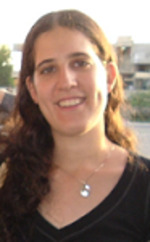About the Authors

Elad Haramaty
Technion - Israel Institute of Technology
eladh[ta]cs[td]technion[td]ac[td]il
Technion - Israel Institute of Technology
eladh[ta]cs[td]technion[td]ac[td]il
Elad Haramaty is a postdoctoral researcher at
Northeastern University in the College of Computer and Information
Science, hosted by
Emanuele Viola.
He earned his Ph.D. from the
Technion - Technion - Israel Institute of Technology under the
guidance of
Amir Shpilka. His research interests
lie in a broad range of areas of theoretical computer science,
especially in algebraic complexity. In his work he has studied mostly
the structure, testability and applications of polynomials and
algebraic codes. This paper was written while Elad was a
Ph.D. student at the Technion.

Noga Ron-Zewi
Institute for Advanced Study, Princeton, and
Rutgers University
nogaz[ta]ias[td]edu
https://sites.google.com/site/nogazewi/
Institute for Advanced Study, Princeton, and
Rutgers University
nogaz[ta]ias[td]edu
https://sites.google.com/site/nogazewi/
Noga Ron-Zewi is an IAS-DIMACS postdoc with a joint
postdoctoral position at the Institute for Advanced Study
(IAS) at Princeton and the Center for Discrete Mathematics
and Theoretical Computer Science (DIMACS) at Rutgers.
Her hosts are
Avi Wigderson and
Michael Saks.
She received her Ph.D. from the Department of Computer Science
at the Technion in 2014, under the supervision of
Eli Ben-Sasson.
Her research interests are in the theory of computation,
with a focus on computational aspects of communication and coding.
This paper was written while Noga was a Ph.D. student at the
Technion.

Madhu Sudan
Microsoft Research New England
Cambridge, MA
madhu[ta]mit[td]edu
people.csail.mit.edu/madhu/
Microsoft Research New England
Cambridge, MA
madhu[ta]mit[td]edu
people.csail.mit.edu/madhu/
Madhu Sudan received his Ph.D.
from the University of California at Berkeley in 1992.
From 1992 to 1997 he was a research staff member at IBM's
Thomas J. Watson Research Center. From
1997 to 2009
he was a faculty
member at the Electrical Engineering and Computer Science
Department at the Massachusetts Institute of Technology. He is
currently a Principal Researcher at Microsoft Research New
England. His research has focussed on Probabilistic Checking of
Proofs, List-Decoding, Property Testing, and Semantic
Communication.
